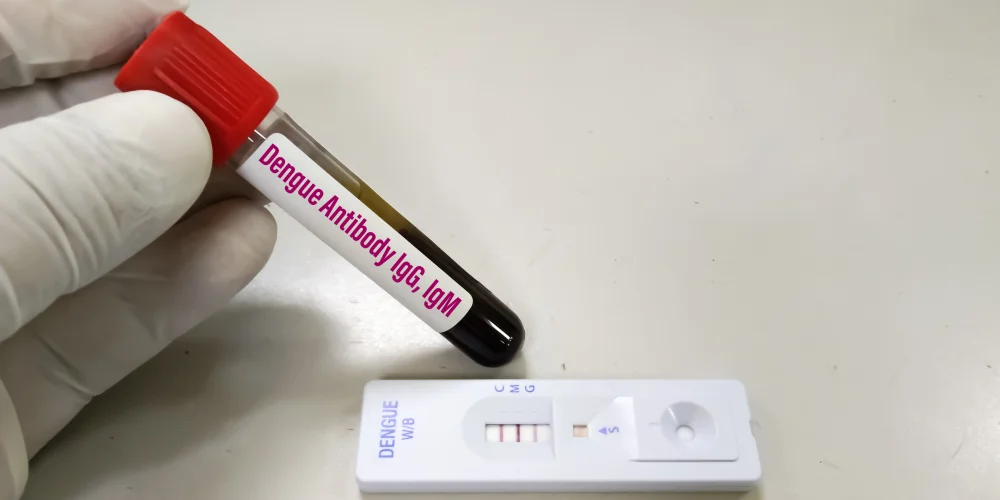Dengue IgG Test
Assessment for Past Dengue Infection
The Dengue IgG Test is a serological test that detects specific Immunoglobulin G (IgG) antibodies against the Dengue virus. IgG antibodies typically appear within 1 to 3 weeks of initial onset of symptoms and may persist for several months or even years. Therefore, the presence of such antibodies merely signifies exposure to the virus or to the vaccine used to immunize against it.

When to Use the Dengue IgG Test?
The Dengue IgG test is utilized in many vital clinical scenarios:
Confirm Previous Infection : The test is primarily utilized to confirm if a person has previously been exposed to the Dengue virus. Since IgG antibodies remain in the body for prolonged periods, it suggests previous exposure.
Epidemiological Studies : For the prevalence assessment of Dengue virus in specific areas or people, this test can be used in population health studies; it offers very useful information for viral spread.
Travel History : In individuals who have recently traveled from the areas where Dengue is present, a test is done to confirm if they had exposure to the virus beforehand.
Monitoring post-vaccination : The test can confirm whether an individual has developed the protective antibodies after vaccination against Dengue; this helps in the assessment of the efficacy of the vaccine.
Preparation for the Dengue IgG Test
Special preparation is not needed before the Dengue IgG test. No restriction on food and beverage consumption is necessary before the test. However, just to be on the safe side, any medication and supplements must be disclosed to a healthcare provider since some of these may interfere with the test.
Parameters Assessed in the Dengue IgG Test
This test will focus mainly on the presence and level of Dengue-specific IgG antibodies in the blood. The amount of such an antibody is usually ascertained through ELISA in a sample. Good levels of IgG antibodies confirm previous infection or vaccination.
Time Required to obtain the Results of Dengue IgG Test
The test result for Dengue IgG is also rapid. For most cases, the result of the test is ready within a few hours up to one day from the time the sample was collected. This speed allows healthcare providers to make a decision in terms of the care and management of the patient.
Dengue IgG Test Cost
The Dengue IgG test at Chirayu SuperSpeciality Hospital is ₹800. This includes the usage of a test kit, lab processing, and the interpretations done by medical professionals. At Chirayu SuperSpeciality Hospital, a lot of effort is taken to provide the test at a minimal rate so that it could be made available to the patients.
Book an Appointment for the Dengue IgG Test
Patients can easily and conveniently get the appointment procedure for the Dengue IgG test at Chirayu SuperSpeciality Hospital. One can apply for the schedule on the website of the hospital or contact the customer care team. The hospital takes all procedures regarding testing comfortably with strict medical protocol conformity and confidentiality for its patients.
What Our Patients Say
Hear from our valued patients about their experiences at Chirayu Super Speciality Hospital and how our care has made a positive impact on their health and well-being.


Professional staff and efficient Dengue testing process.


Confidential handling of results and thorough patient education.


Accurate Dengue IgG results provided quickly at Chirayu Hospital.


Clear explanations and friendly service during my Dengue IgG test.


Knowledgeable team ensured my Dengue test was hassle-free.


Recommended for reliable Dengue antibody testing.


Comprehensive Dengue testing services with competitive pricing.


Personalized care throughout the Dengue testing procedure.


Confident in the reliability of Dengue IgM test outcomes.


Professional staff explained Dengue IgM results clearly.
Frequently Asked Questions
Here, we provide answers to some of the most commonly asked questions to help you better understand our services, policies, and facilities. If you have any additional questions, please do not hesitate to contact us.
A positive result indicates past infection with the Dengue virus or successful vaccination against Dengue.
No, additional tests, such as Dengue IgM or PCR, may be required to differentiate recent infections from past ones.
No, the Dengue IgG test is not suitable for diagnosing acute Dengue infection. IgG antibodies appear later in the course of infection.
Dengue IgG antibodies can remain detectable in the bloodstream for months to years after infection or vaccination.
A negative result suggests no detectable Dengue IgG antibodies. If symptoms persist or there is a recent exposure, consult a healthcare provider for further evaluation.